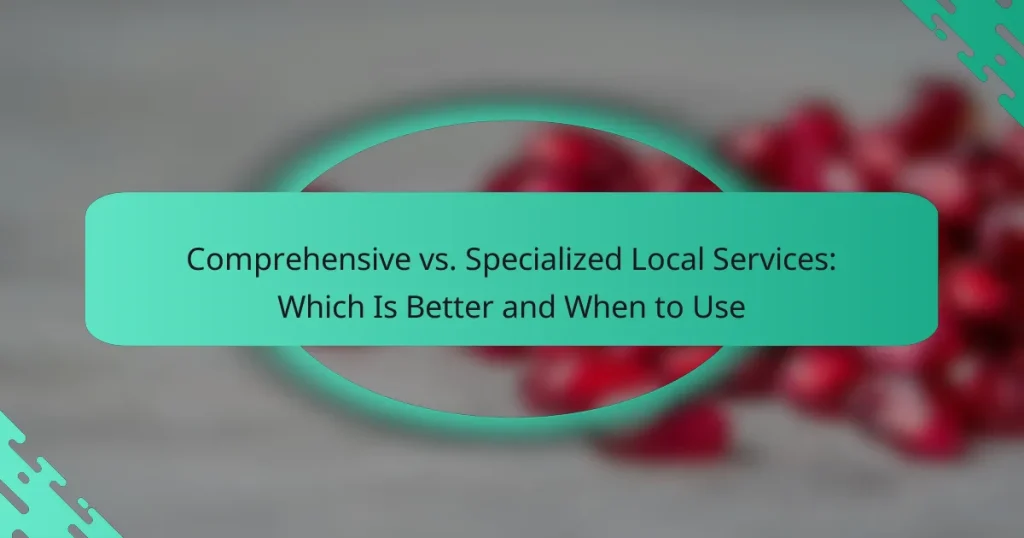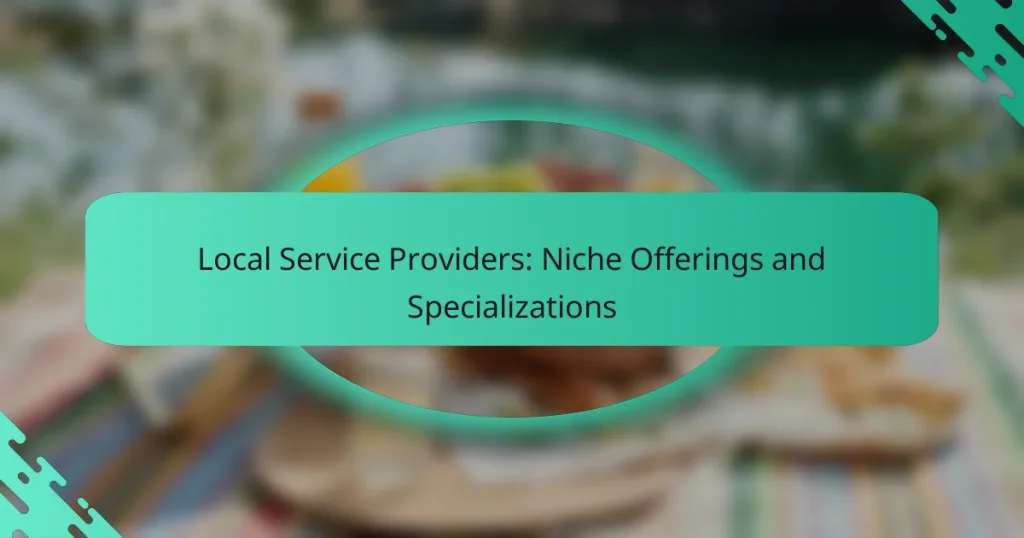Local service providers play a crucial role in meeting the diverse needs of both residential and commercial clients. From home cleaning and landscaping to plumbing and personal training, these professionals offer a wide range of essential services designed for convenience and maintenance. When selecting a provider, it’s important to evaluate their reputation, experience, and pricing models to ensure you find the best fit for your specific requirements.
Seasonal Demand: Impact on Local Service Offerings
Bundled Services: Value, Cost Savings and Convenience
Comprehensive vs. Specialized Local Services: Which Is Better and When to Use
Local Regulations: Effects on Service Availability
Local Service Providers: Niche Offerings and Specializations
Emerging Local Services: Trends, Innovations and Community Impact
What local services are commonly offered?
Local service providers typically offer a variety of essential services that cater to residential and commercial needs. Common offerings include home cleaning, landscaping, plumbing, electrical work, and personal training, each addressing specific requirements for convenience and maintenance.
Home cleaning services
Home cleaning services focus on maintaining cleanliness and hygiene in residential spaces. These services can range from regular housekeeping to deep cleaning sessions, often tailored to client preferences.
When hiring a cleaning service, consider factors such as the frequency of cleaning, types of cleaning products used, and whether the service is insured. Typical costs can vary widely, often falling between $25 to $50 per hour, depending on the region and service complexity.
Landscaping services
Landscaping services enhance outdoor spaces through design, installation, and maintenance. These services may include lawn care, planting, hardscaping, and seasonal clean-up.
When selecting a landscaping provider, assess their portfolio and ask for references. Costs can range from a few hundred to several thousand dollars, depending on project scope and materials used. Regular maintenance can also be arranged for ongoing care.
Plumbing services
Plumbing services address issues related to water supply and drainage systems. Common tasks include fixing leaks, installing fixtures, and conducting routine maintenance to prevent future problems.
It’s crucial to hire licensed plumbers, as they are familiar with local codes and regulations. Typical service fees can range from $100 to $300 for standard repairs, while emergency services may incur higher charges, especially during off-hours.
Electrical services
Electrical services involve the installation, repair, and maintenance of electrical systems. This includes wiring, lighting installation, and troubleshooting electrical issues.
Always hire licensed electricians to ensure safety and compliance with local regulations. Costs for electrical work can vary, with standard service calls typically starting around $100, while larger projects may exceed several thousand dollars, depending on complexity.
Personal training services
Personal training services provide tailored fitness programs to help individuals achieve their health goals. Trainers often assess clients’ fitness levels and create customized workout plans.
When choosing a personal trainer, consider their qualifications and specialties. Rates can vary significantly, typically ranging from $30 to $100 per session, depending on the trainer’s experience and location. Group sessions may offer a more affordable alternative.
How to choose the right local service provider?
Choosing the right local service provider involves assessing their reputation, qualifications, and reliability. Start by considering their experience in the specific service you need and how well they meet local standards.
Check online reviews
Online reviews are a valuable resource for evaluating local service providers. Look for feedback on platforms like Google, Yelp, or specialized service directories to gauge customer satisfaction and service quality.
Pay attention to both positive and negative reviews, as they can provide insights into the provider’s strengths and weaknesses. A provider with consistently high ratings is often a safer choice.
Verify licenses and insurance
Ensuring that a service provider has the necessary licenses and insurance is crucial for protecting yourself and your property. Check local regulations to understand what licenses are required for the specific service in your area.
Request proof of insurance to cover any potential damages or accidents that may occur during service. This step can save you from unexpected costs and liabilities.
Ask for referrals
Referrals from friends, family, or colleagues can lead you to trustworthy local service providers. Personal recommendations often come with firsthand experiences, giving you a clearer picture of what to expect.
When asking for referrals, inquire about the specific services rendered, the provider’s professionalism, and overall satisfaction. This information can help you make a more informed decision.
What are the pricing models for local services?
Local service providers typically use various pricing models to charge for their services, including hourly rates, flat fees, and subscription models. Understanding these models can help you choose the right service based on your needs and budget.
Hourly rates
Hourly rates are a common pricing model where clients pay for the actual time spent on the service. This model is often used by professionals such as plumbers, electricians, and consultants. Rates can vary widely based on the type of service, location, and provider experience, generally ranging from $50 to $150 per hour in the U.S.
When considering hourly rates, it’s essential to ask for an estimate of the total hours required to complete the job. Be cautious of potential overages, and clarify whether the rate includes materials or additional fees.
Flat fees
Flat fees involve a set price for a specific service, regardless of the time taken. This model is often applied in services like home cleaning, landscaping, or basic repairs. Flat fees provide clarity on costs upfront, allowing clients to budget effectively.
However, ensure that the flat fee covers all aspects of the service, including any materials or travel expenses. It’s advisable to compare flat fees among different providers to ensure you receive a fair deal.
Subscription models
Subscription models offer ongoing services for a regular fee, typically billed monthly or annually. This model is popular among service providers like lawn care, pest control, and home maintenance companies. Subscriptions can provide cost savings and convenience for clients who require regular services.
When considering a subscription, evaluate the frequency of services provided and any additional benefits included, such as priority scheduling or discounts on other services. Be mindful of cancellation policies and any long-term commitments required.
What permits are required for local service providers?
Local service providers typically need a variety of permits to operate legally, which can vary by location and the type of services offered. Understanding these requirements is crucial for compliance and successful business operations.
Business licenses
Business licenses are essential for local service providers to legally conduct their operations. These licenses are usually issued by state or local governments and can vary significantly depending on the industry and location. For example, a general contractor may need a specific contractor’s license, while a cleaning service might only require a basic business license.
To obtain a business license, providers often need to submit an application, pay a fee, and sometimes provide proof of insurance or bonding. It’s advisable to check with local regulatory agencies to understand the specific requirements and costs involved.
Specialty permits
In addition to general business licenses, many local service providers may need specialty permits related to their specific services. These permits can include health permits for food-related businesses, zoning permits for construction services, or environmental permits for waste management companies. Each type of permit serves to ensure that the services provided meet local regulations and standards.
Obtaining specialty permits often involves more detailed applications and inspections. Providers should research the specific permits required for their industry and location, as failing to secure these can lead to fines or business shutdowns. Consulting with local authorities or industry associations can provide valuable guidance on navigating these requirements.
How do local service providers ensure quality?
Local service providers ensure quality through rigorous training, adherence to industry standards, and customer feedback mechanisms. By focusing on these areas, they can maintain high service levels and customer satisfaction.
Training and certifications
Training and certifications are essential for local service providers to demonstrate their expertise and commitment to quality. Many providers undergo specialized training programs that cover both technical skills and customer service practices.
Certifications from recognized industry bodies can enhance credibility. For example, a plumbing service with certification from a national plumbing association may be seen as more reliable than one without such credentials.
When selecting a service provider, check for relevant certifications and inquire about their training processes. This can help ensure that you receive competent and professional service.






